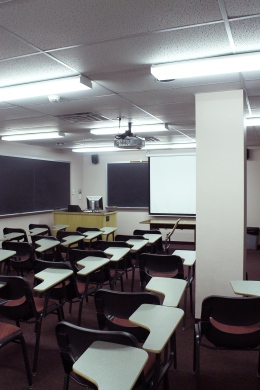By Lucas Reilly ’13
Photos by Kate Cherney ’15/ The Lafayette
It has taken nearly 20 years, but the Common Course of Study (CCS) is finally getting a makeover. According to a report by the Curriculum and Educational Policies Committee (CEP), all students in next year’s freshmen class will have to complete:
A Freshman Year Seminar.
One humanity, social science, natural science and two courses outside of their home division.
One “Values” course.
Two “Global and Multiculturalism” courses.
One “Quantitative Reasoning” course.
Three writing, or “W”, courses: one within the major, outside the major and a third in any discipline.
Two foreign language courses.
The elements of VaST have been spread across the new curriculum, replaced partly by the Values course. The two Global and Multiculturalism classes will replace the Foreign Culture Cluster, and Quantitative Reasoning will expand the math requirement.
So what makes these new requirements different? According to Dean of the College Hannah Stewart-Gambino, it is all about flexibility.
“With the new CCS, students will have more choices,” Stewart-Gambino said. For example, the Values requirement will allow students to take classes on moral, political and ethical issues in any discipline.
Since Values courses will span numerous disciplines, students should have an easier time finding classes relevant to their interests.
“I waited for most of my college career to find a VaST that actually pertained to my career goals because many of the courses seemed pointless towards furthering anything except filling a requirement,” said Nathaniel Kelley ‘12, a self-designed music major.
“With VaST, we restricted our study of values to science and technology,” Stewart-Gambino said. “But we realized it doesn’t have to be that way. So we took the components of VaST and found them other homes.”
One of these new homes includes the new Science and Technology in Social Contexts courses (STSCs). According to the new CCS, these classes will be taught by the science and engineering departments to “address a scientific or technological issue of timely importance.” However, unlike VaST, students will not be required to take an STSC, nor will STSC’s be “W” courses.
“With the STSC, we’ve strengthened [the social and cultural purpose] of VaST while moving the writing and analysis of values to other courses,” said Professor of English Suzanne Westfall, head of the CEP.
The CEP has also decided to overhaul the Foreign Culture Cluster. Rather than confining students to study one cultural region, Global and Multiculturalism courses will give students greater liberty to explore a range of global issues. The goal is to teach students how to work across cultural and global boundaries.
“You guys live in a global world, a world that didn’t exist twenty years ago when the old CCS was made.” Stewart-Gambino said. “The foreign culture cluster seems anachronistic now.”
“Many faculty were very unsatisfied with the vague and general list of courses that students could ‘tick off the menu’ without really delving into issues of global citizenship or cultural diversity,” Westfall said.
The Implementation Committee is currently creating a robust list of classes that will fulfill the new Values, Global, and Multiculturalism requirements.
The Committee is doing the same for the new Quantitative Reasoning requirement. Unlike the old math requirement, Quantitative Reasoning will include math-heavy courses that are outside of the department. Many economics classes, as well as quantitative methods in psychology and sociology, will fulfill the new requirement.
“As a Psychology major, I am entirely in favor of this change,” Kara Enz ’13 said. “We have a required class called Quantitative Methods, which is a statistics course that currently does not count for the math requirement, which I think it should.”
In addition to all these changes, students will be able to satisfy multiple requirements with a single course. For example, a “W” course that meets a Values outcome could conceivably count for both.
Westfall views these changes optimistically. “We hope this new CSS will allow students to experiment with courses, with interdisciplinarity, and with experiences that they might not have had time for in the past.”


















































































































